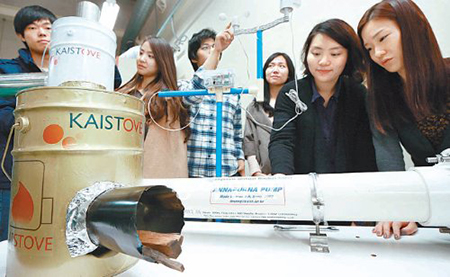From January 7 to 18, Professor Tae-ho Song from the Department of Mechanical Engineering and 14 members of Engineers Without Borders of KAIST (EWB-KAIST), an organization that provides developing countries the engineering aid they need, set off to the alpines of Nepal. EWB-KAIST, classified under the International Relations Team, was founded in December of 2011, and 50 students and faculties were selected as the 1st members in April of last year.
This altruistic mission targeted Annapurn of north-central Nepal. After gathering information from the villagers and Dr. Mahabir Pun, creator of social enterprise Nepal Wireless Networking Project and EWB-KAIST's partner in Nepal, four main projects were chosen among the various engineering problems: the smokeless stove, solar power and irrigation pumping, water filtration system, and weather observer system.
The smokeless stove project aimed to reduce the release of harmful gases from burning wood and animal waste, which can lead to lung cancer, to use as fuel. The solar power and irrigation pumping project was targeted for Mohare Danda (3300m above sea level), where it is difficult to obtain water. EWB-KAIST cooperated with OCI's solar power team to develop an appropriate pipe infrastructure that does not freeze during the harsh winter seasons. The potable water project focused on enhancing the level of water filtration, particularly during monsoons, when even their small supply of clean water becomes soiled. The last project aimed to develop a weather observer system for the airport, located in the midst of the alpines and labeled as the world's most dangerous airport, to be able to predict weather conditions to reduce the risk of plane crashes.

With four to eight members per project, each group researched thoroughly for seven months and developed prototypes. Then, 14 members were selected to go to Nepal and install these systems. Some projects showed remarkable result with some room for improvement, and other projects faced challenges by unforeseen factors.
EWB-KAIST returned with more knowledge and insight than they had prior to the visit. One member stated, "We will use the problems we faced during the 1st project as stepping stones for future projects and work towards improving the standard of living for the locals in Nepal." On March 11, EWB-KAIST held an orientation and took applications for 2nd project members till March 15. For more information, visit http://ewb.kaist.ac.kr.

